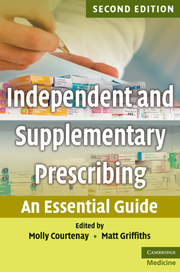Book contents
- Frontmatter
- Contents
- List of contributors
- Foreword to the second edition
- Preface to the second edition
- 1 Non-medical prescribing: an overview
- 2 Non-medical prescribing in a multidisciplinary team context
- 3 Consultation skills and decision making
- 4 Legal aspects of independent and supplementary prescribing
- 5 Ethical issues in independent and supplementary prescribing
- 6 Psychology and sociology of prescribing
- 7 Applied pharmacology
- 8 Monitoring skills
- 9 Promoting concordance in prescribing interactions
- 10 Evidence-based prescribing
- 11 Extended/supplementary prescribing: a public health perspective
- 12 Calculation skills
- 13 Prescribing in practice: how it works
- 14 Minimising the risk of prescribing error
- Index
- References
5 - Ethical issues in independent and supplementary prescribing
Published online by Cambridge University Press: 10 January 2011
- Frontmatter
- Contents
- List of contributors
- Foreword to the second edition
- Preface to the second edition
- 1 Non-medical prescribing: an overview
- 2 Non-medical prescribing in a multidisciplinary team context
- 3 Consultation skills and decision making
- 4 Legal aspects of independent and supplementary prescribing
- 5 Ethical issues in independent and supplementary prescribing
- 6 Psychology and sociology of prescribing
- 7 Applied pharmacology
- 8 Monitoring skills
- 9 Promoting concordance in prescribing interactions
- 10 Evidence-based prescribing
- 11 Extended/supplementary prescribing: a public health perspective
- 12 Calculation skills
- 13 Prescribing in practice: how it works
- 14 Minimising the risk of prescribing error
- Index
- References
Summary
Ethics is concerned with the promotion of the high standards of conduct by which the public rightly expects healthcare practitioners to abide. The relationship between law and ethics in a democratic society should always be a close one. Legislators and judges create laws and legal decisions which can be enforced through the courts. Ethicists, on the other hand, spend their time reflecting on the implications of legal decisions and exploring the ways in which conduct can be guided by rational and coherent principles. There is a constant dialogue between legal scholars and ethicists as each seek to use the other's discipline to shed light on their own concerns. So it is not surprising that most textbooks for the healthcare professions, like this one, combine discussion of both law and ethics.
At the heart of ethics lies the process of reflecting on the dilemmas raised by professional practice. The contribution that ethics makes is to provide a range of possible theoretical tools or frameworks which may help to elucidate the issues that are at stake, and which may provide consistent guidance on which principles should be given the most weight. Ethics does not, therefore, provide a simple system which will provide the ‘right’ answer when faced with any dilemma in prescribing practice. It is the starting point for the debate rather than its neat and tidy conclusion. Professional practice in healthcare in the modern world requires the balancing of complex competing needs and interests.
- Type
- Chapter
- Information
- Independent and Supplementary PrescribingAn Essential Guide, pp. 42 - 52Publisher: Cambridge University PressPrint publication year: 2010
References
- 4
- Cited by



